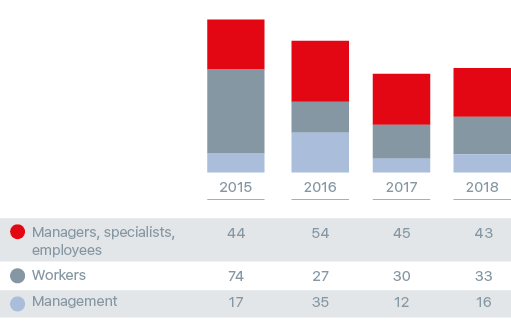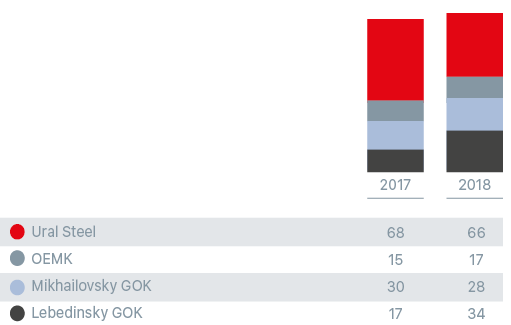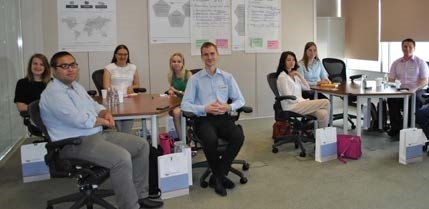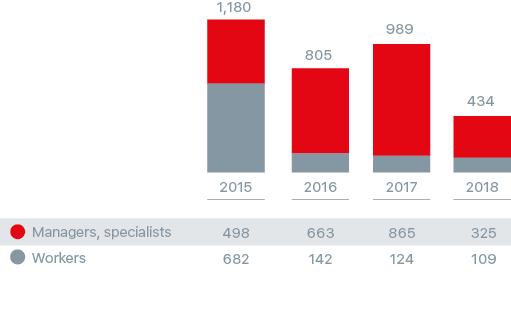Training and Development
Metalloinvest views the continuous training and development of employees as a priority and an investment in increasing productivity and operating efficiency.
404-1
The Company invested 1,583 hours (198 days) in employee training in the reporting period, an increase of 4% from 2017. The average number of staff training hours increased by 14%.


404-2
Metalloinvest’s educational programmes encompass a wide range of disciplines: the development of technical and managerial skills, the study and understanding of business processes, the development of safety arrangements in the workplace, environmental protection and environmental safety, and waste management. All education costs are fully paid by the Company. Educational programmes are implemented through four main forms of training:
- functional training carried out at the training centres of the Company’s plants includes professional retraining programs, advanced training courses, and training for secondary and related blue-collar trades (mechanic, fitter, operator, technician, controller, machinist, electric and gas welder, slinger, steelworker, roller man, etc.);
- distance learning using the Web Tutor and OLIMP OKS systems. This type of training has become increasingly popular because of its flexibility;
- training at universities in an employee’s core areas of activity with compensation for training costs;
- corporate training for the development of leadership skills among middle and senior managers.

Corporate training programmes
Corporate training in the reporting period was conducted as part of three five-module programmes:
- Comprehensive development program – for representatives of senior management as well as level n-2 and n-3 managers
- Production Leaders Institute – for department heads and workshop managers (middle management);
- Foreman School – for foremen
These programmes are based on the MBA principle and focus more on the development of managerial and leadership skills. The programmes cover the following subjects:
- economics and business laws;
- principles of managing people, setting goals, and resource planning;
- occupational health and safety;
- integration of innovations and digitalisation into current business processes;
- operating principles of the business system.
Three to four days of classes are devoted to each aspect during which students attend lectures by business representatives (lecturers from INSEAD and MIT), take part in face-to-face practical seminars, and perform project work.
The main difference between the corporate training programmes and educational programmes implemented in the previous reporting period is their complexity. Specifically, the programmes of previous years covered only one subject, while all five thematic blocks must be completed as part of training starting from 2018. This helps to create common business thinking at all levels of management.
Plans for 2019
In 2019, corporate training programme participants will defend their graduation projects in front of the Company’s CEO and other senior managers. In addition to the economic value for the Company, defending the projects will be an excellent chance for employees to demonstrate their knowledge and skills.

Development of young professionals
In order to develop professional and leadership qualities among young professionals and get them involved in solving critical tasks in production, automation as well as the staff and social policy, the Company has been implementing the Corporate Forum of Youth Initiatives (CFYI) programme since 2016. A total of three corporate forums of youth initiatives were held as part of the programme and were attended by more than 470 employees who prepared and submitted more than 300 projects.
Talent Pool Programme
The Company’s enterprises continued to implement a talent pool programme whose goal is to develop the most promising employees of Metalloinvest. A total of 434 employees took part in the programme during the reporting period.
The key difference in the 2018 programme was the creation of a uniform talent pool for all the Company’s enterprises (top 500 and top 100).
The talent pool was formed in several stages. During the first stage, selections were carried out at the plant level: the selection criterion was that the candidate must have skills that corresponded to the specifics of the enterprise’s activities and internal needs. During the second stage, the selected candidates were evaluated in terms of their compliance with general corporate requirements. The evaluation resulted in the selection of 500 candidates (top 500), of which 100 were included in the list of finalists (top 100). The second stage of the selection was held with the participation of external specialists – the companies Ward Howell and Ecopsy.

Metalloinvest plans to continue working with talent pool members in the future reporting period in order to further develop their professional potential. The planned initiatives include the Generation of the Future project as part of which the Company’s management will hold quarterly meetings with representatives of the talent pool. This project aims to solve two tasks: helping immerse talent pool members in their profession through interaction with senior representatives who are responsible for a specific area as well as sharing knowledge and expertise, and helping them integrate into the corporate culture, which in the future will make it possible to prepare for the transition from their positions at the plants to positions at the Management Company.
In addition, a strategic session is scheduled to be held in 2019 for talent pool representatives as part of the process of their integration into advisory management processes to resolve business problems. In an effort to provide the talent pool members with a global understanding of business processes, they are supposed to engage in the practice of sharing their experience with companies that are leaders in the metals and mining industries by sending and receiving delegations.






